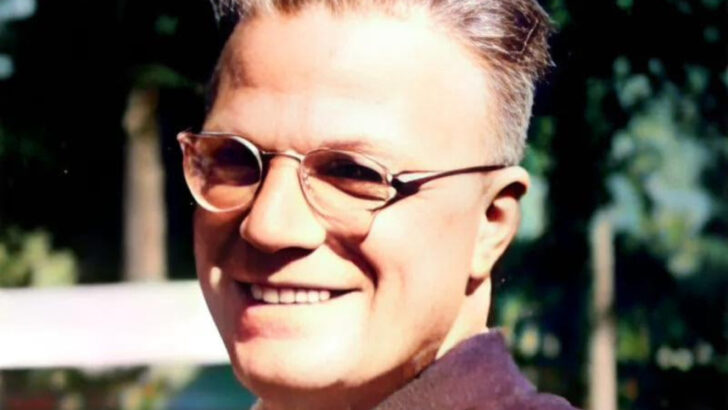We had an unusual Advent in the Kent parish of Deal: the parish priest, Canon Brian Coyle (originally from Northern Ireland) invited one of the parishioners to give a talk, with response and reflections from parishioners in true Synodal fashion.
The subject involved the German Jesuit martyr, Fr Alfred Delp, hanged by the Nazis in 1945 because of his resistance to the regime; and Dietrich Bonhoeffer, the Lutheran pastor and theologian who was an active anti-Nazi and died in a concentration camp in the spring of 1945.
Ben Bano, who gave the talk, is a parishioner of senior years who has been active in supporting refugees, and who recently completed a Masters in Theology on Christian opposition to the Nazi regime.
Conscience
Both of these brave Christians of conscience were held in captivity just 80 years ago, in the winter of 1944 – Fr Delp was kept in shackles in Berlin-Plötzensee prison. And yet during this tormenting time, Alfred Delp meditated on the spiritual meaning of Advent, and the significance of waiting – waiting for something better. “I see this year’s Advent with an intensity and presentiment like never before,” Fr Delp wrote. “When I pace back and forth in my cell, three steps forward and three steps back, hands in irons, ahead of my unknown destiny. I understand very differently than before those ancient promises of the coming Lord who will redeem us and set us free.”
He went through some moments of despair – echoing John of the Cross’s “Dark Night of the Soul” – and yet he wrote that in his cell “God becomes a living presence of all that is good.” He came to feel that “we are blind to spiritual things” and that “we must find ways to tackle spiritual wilderness.”
We have learned to see the great events of history from below, from the perspectives of the outcasts, the maltreated, the powerless, the oppressed and reviled”
He also wrote: “May the Advent figure of John the Baptist, of the inexorable messenger and warning prophet in God’s name not be a stranger in our wilderness.”
Dietrich Bonhoeffer reflected that “we have learned to see the great events of history from below, from the perspectives of the outcasts, the maltreated, the powerless, the oppressed and reviled. In short, from the perspective of suffering.” Bonhoeffer had been a follower of the rationalist philosopher Kant, but came to see that reason was not enough.
Christmas would symbolise for both these men at Advent that there could be a better world. They went to heaven: we also hope for a better world on Earth.
The wonder of creation
The Booker Prize for literature was won this year by a slim volume called Orbital by Samantha Harvey. It has proved popular with readers – perhaps part of its appeal is that it is short (136 pages) at a time when some books are veritable doorstoppers, (though they may also be good.)
Orbital is unusual, as the author imagines what it is like to be an astronaut, held in space, and orbiting around the Earth. What is enchanting about the story is that it illuminates the wonder of Planet Earth, and its place as the common home to all of humanity. During a day in space, astronauts will “circle the Earth sixteen times. They’ll see sixteen sunrises and sixteen sunsets, sixteen days and sixteen nights…autumn and spring, glaciers and deserts, wildernesses and war zones.” Weightlessly, they feel the awe of the universe, and experience a huge appreciation of the beauty of our world.
Although I know it’s in human nature to go exploring through the cosmos, I cannot believe anything but barren rocks will ever be found on Mars, or any other planet. Our Earth is absolutely unique, and the one that the Creator made for us. Orbital puts it in poetic perspective.
***
Young people, in general, are said to be dropping the Christmas card tradition, accustomed as they are to sending texts. I’ve debated with myself whether to follow their example. The cost is not an inconsiderable factor – although I know that sounds stingy. I have friends and relations who haven’t sent cards for years, and they tell me that nobody minds (or even notices) and it’s saved them from another Christmas stress or chore.
But then, every card that drops through my letter-box becomes a source of guilt. Surely I should reply to those who went to the trouble of sending me a card? And isn’t it a nice way of keeping in touch with old friends and acquaintances? A card with a Christmas message brings pleasure. “Goodwill to all people,” is part of the meaning of Christmas.
What will probably happen is that I’ll bung off a few at the last minute, so that the exercise will be half-done. But after all, it’s the thought that counts, and so with all the powers of telepathy, I wish one and all a truly peaceful and blessed Christmas, full of the joy of the Nativity.


 Mary Kenny
Mary Kenny Fr Alfred Delp SJ
Fr Alfred Delp SJ 